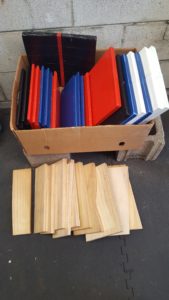Answer: Because you don’t resource it!
You can skip the rest of the article if you like, because it’s that simple.

Indications your breaking isn’t much good:
- You or your students hurt yourself often.
- There are boards at your school that are too hard for anyone.
- You hand hold boards, and they’re always wooden.
- The boards used at gradings seem a bit easy, or way too hard.
- You organise and participate in tournaments where nobody breaks much, either because the event isn’t included, or nobody succeeds.
- You can’t really explain why boards aren’t breaking for you, or you can’t seem to get your students achieving.
- When you teach, there are six different people all giving conflicting advice to the one person who’s practicing.
- It’s an area you don’t like spending time on.
Reasons your breaking isn’t much good:
Resourcing.
- You don’t condition your breaking tools, or teach your students to.
- Your boards are too flimsy or too old, or so hard that nobody uses them.
- You break unreliable, variable, fickle timber instead of reliable, consistent, calibrated plastic.
- The board holding machines, if you even have them, aren’t well designed. They actually get in the way, can’t be adjusted, can’t hold many boards or the right type o board, and they hurt you if you make a mistake.
- When you host tournaments you add breaking and special technique as an afterthought, and you don’t tell people ahead of time what you want them to break and with what techniques. Sometimes the requirements are embarrassingly easy, sometimes unreasonably difficult.
- The same as above, but for gradings.
- You don’t spend time and money on books, articles, essays or seminars about it.
- You use patterns and sparring and hitting soft bags as a reference point for “power” instead of studying the science.
- You don’t give class time to practising breaking, and when you do, you don’t separate practice and performance.

Solutions
Resourcing.
- Do your conditioning, little and often, for years – you are a martial artist, and your fists should be ready.
- Do your research. Ask experts for their advice, attend seminars and buy books. Don’t listen to people unless their students can break as well as them.
- Have a good range of boards at your school, so everyone can experience success at their level.
- Don’t hand-hold boards. Holding machines are consistent, they don’t flinch or tense at the wrong time, or hold at weak angles. By removing the human element you can focus more on what actually makes a technique successful.
- If you host a tournament or examination give plenty of notice about what you want to see broken. If at all possible have the same set of boards for each event – that way the breaks won’t be dependent on whatever boards can be found at the last minute. It is much better for progress and safety to have boards that aren’t sometimes too old and worn and other times brand new.
- Teach it. Ensure only one person is giving advice at a time, that practice is separate from public performance, and that all your coaches / instructors agree on technique.
- Include breaking in your examination system, and in your tournaments. If you’re doing Taekwon-Do there should be a very good reason you aren’t breaking boards regularly.
Brendan Doogan 5th Dan, Dragon’s Spirit, Papatoetoe
